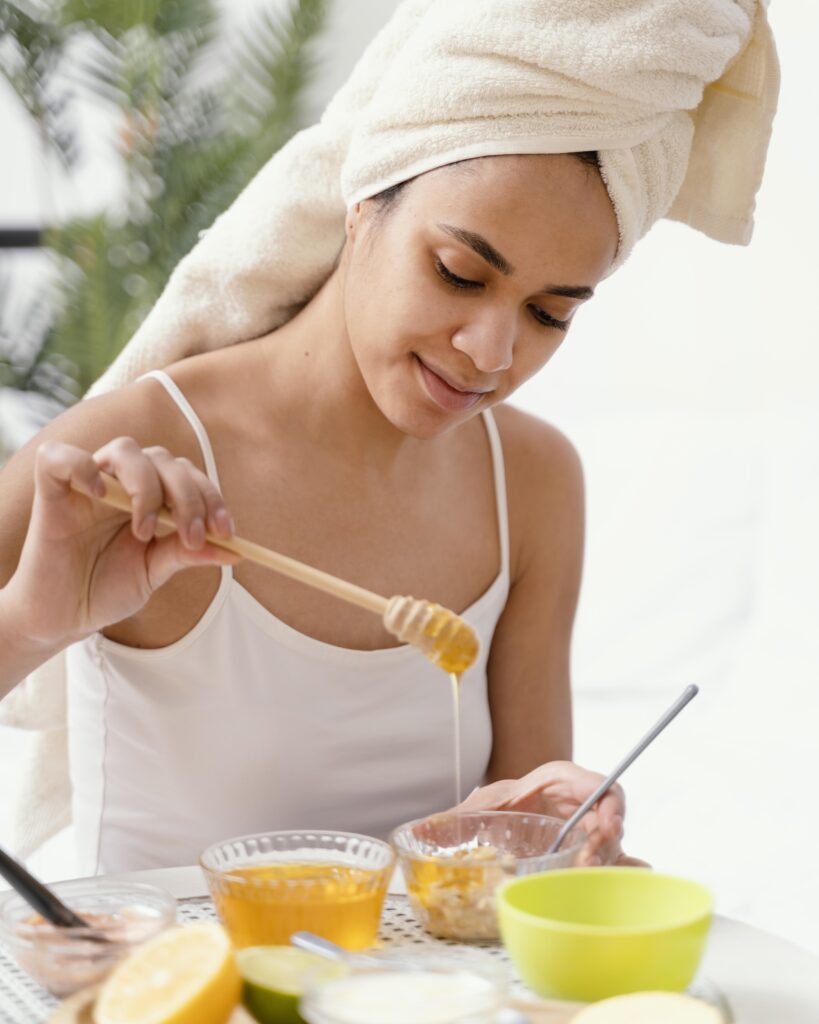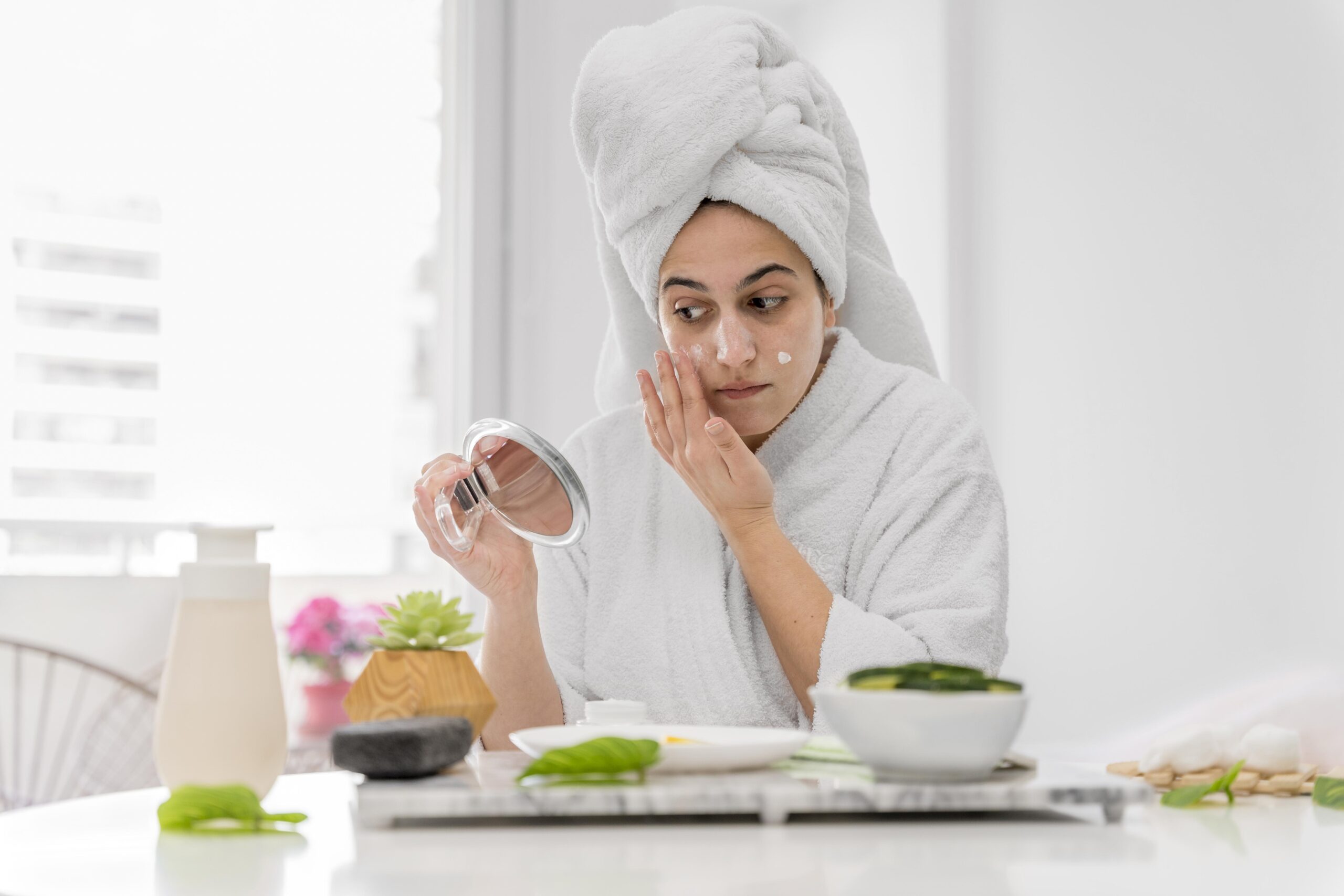Acne is one of the most common skin concerns in the world, affecting nearly 9.4% of the global population according to a study published in the Journal of National Library of Medicine. From teenagers struggling with hormonal breakouts to adults facing stress-related flare-ups, acne can impact not just the skin but also confidence and overall well-being.
In Pakistan and South Asia, people often turn to natural skin acne remedies and desi totkay, time-tested household solutions passed down through generations. Ingredients like turmeric, aloe vera, honey, neem, and sandalwood are not only inexpensive but are also backed by research for their antibacterial and anti-inflammatory properties. For example, studies show that aloe vera gel can significantly reduce acne lesions thanks to its soothing and healing effects.
This blog will explore 7 natural skin acne remedies and totkay you can safely try at home, blending traditional wisdom with modern science. Whether you’re looking for gentle alternatives to chemical treatments or simple solutions straight from your kitchen, these remedies can help you get clearer and healthier skin naturally.
7 Natural Skin Acne Remedies And Desi Totkay
1. Neem Leaves (Azadirachta Indica)
Neem is one of the most powerful natural remedies for acne. Its antibacterial and antifungal properties kill acne-causing bacteria and reduce inflammation. Grinding neem leaves into a paste and applying it to the skin can help dry out pimples and prevent future breakouts. Regular use may also improve skin texture and reduce marks.
2. Aloe Vera Gel
Aloe vera is widely known for soothing irritated skin. Its cooling effect calms redness and swelling caused by acne. Fresh aloe vera gel taken directly from the plant works best. Applying it to the skin daily not only helps with acne but also improves hydration, leaving the skin soft and refreshed.
3. Honey and Cinnamon Mask

Honey is a natural antibacterial agent, while cinnamon increases blood circulation. When combined, they form a strong acne-fighting mask. Applying a thin layer of honey mixed with a pinch of cinnamon powder helps reduce pimples and keeps the skin glowing. This remedy is also gentle and suitable for most skin types.
4. Multani Mitti (Fuller’s Earth)
Multani mitti is a traditional beauty ingredient used for cleansing the skin. It absorbs excess oil and removes dirt from pores, preventing breakouts. Mixing it with rose water and applying it as a face pack is one of the oldest desi totkay for acne. Regular use can also lighten scars and give the skin a natural glow.
5. Turmeric Paste
Turmeric is a natural anti-inflammatory and antiseptic. Making a paste with turmeric powder and water or yogurt can reduce redness and swelling caused by acne. It also helps fade acne scars over time. However, it may leave a slight yellow tint on the skin, which usually fades after washing.
6. Lemon Juice
Lemon juice is rich in Vitamin C and has natural astringent properties. Applying diluted lemon juice on pimples helps dry them out and reduce oil production. However, it must be used carefully, as applying directly to sensitive skin may cause irritation. Always rinse it off after 10–15 minutes and avoid sun exposure right after use.
7. Tea Tree Oil
Although not a traditional South Asian totka, tea tree oil has become popular in desi households for acne. Its antibacterial properties make it effective for spot treatment. A few drops mixed with a carrier oil (like coconut oil) can be applied directly to pimples. It reduces swelling, redness, and speeds up healing.
Are Natural Remedies or Desi Totkay Safe For You?
Desi totkay and natural skin acne remedies have been part of our households for generations, often passed down by elders as trusted solutions for skin problems like acne. Ingredients such as turmeric, aloe vera, sandalwood, neem, and honey are known for their antibacterial and soothing properties. But while they can be effective for mild acne and overall skin health, it’s important to remember that natural doesn’t always mean risk-free.
ALSO READ
What is Skin Acne – Symptoms, Causes And Types
Some people may experience allergic reactions, irritation, or worsening of acne depending on their skin type. For example, lemon juice can lighten scars but may cause burning or dryness if applied excessively. Similarly, toothpaste or harsh scrubs, often considered “totkay”, can damage the skin barrier.
Dermatologists recommend patch-testing natural skin acne remedies before applying it to the entire face and consulting a skin specialist if acne is moderate to severe. In short, desi totkay can be helpful as supportive care but should not replace medical treatments when the condition is serious. A balance between tradition and modern dermatology is the safest way forward.
Sum Up
Acne can be frustrating, but natural skin acne remedies like desi totkay offer safe and effective solutions. From neem and aloe vera to turmeric and honey, these ingredients have stood the test of time. While results may take longer than modern medicines, they provide gentle care and improve overall skin health. With consistency, these simple home remedies can make a big difference in managing acne naturally.
FAQs
Are desi totkay effective for severe acne?
Desi totkay can help with mild to moderate acne, but severe cases may require medical treatment. Dermatologists often suggest combining natural remedies with prescribed care for better results.
How long does it take for desi totkay to work?
Results vary. Some people notice improvements in a few days, while others may take weeks. Consistency and patience are key for natural remedies.
Can skin acne remedies cause side effects?
Most are safe, but some ingredients like lemon juice may irritate sensitive skin. Always test a small patch before applying to the whole face.
Should I stop using skincare products if I use totkay?
Not at all. You can combine desi totkay with a gentle skincare routine. Just avoid mixing too many remedies at once, as it may irritate the skin.
Sources: National Library of Medicine



Join The Discussion